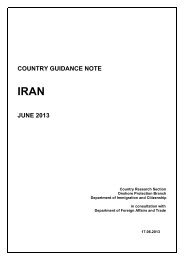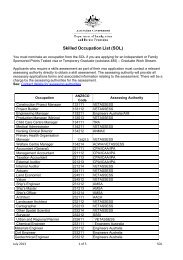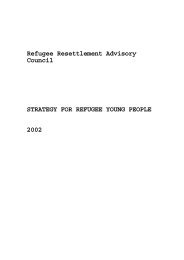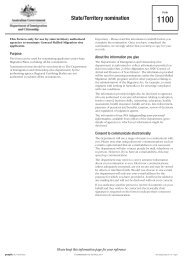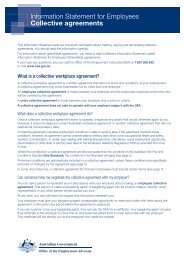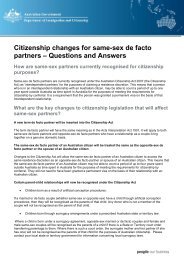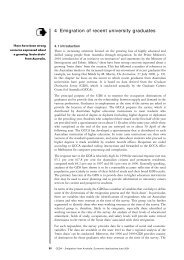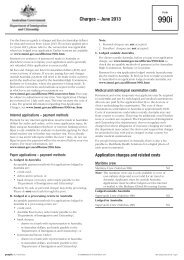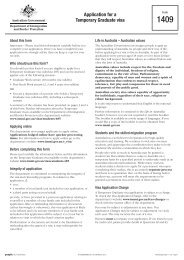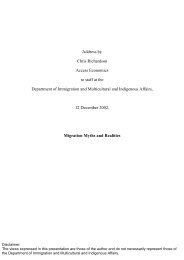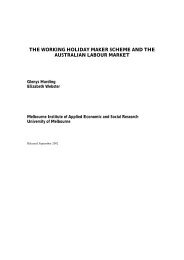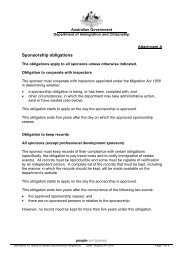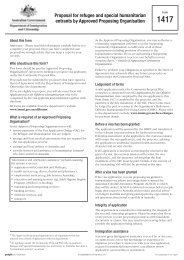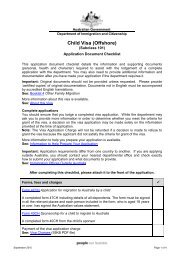Evaluation of the Integrated Humanitarian Settlement Strategy (IHSS)
Evaluation of the Integrated Humanitarian Settlement Strategy (IHSS)
Evaluation of the Integrated Humanitarian Settlement Strategy (IHSS)
Create successful ePaper yourself
Turn your PDF publications into a flip-book with our unique Google optimized e-Paper software.
accommodation, and linking <strong>the</strong>m with essential services. In actuality many proposers are ei<strong>the</strong>r not<br />
able or not willing to provide adequate settlement support when <strong>the</strong>ir proposed entrant(s) arrives<br />
onshore. None<strong>the</strong>less, because <strong>of</strong> <strong>the</strong> expectation that proposers will meet entrants’ needs, services<br />
are designed to provide support to proposers not entrants. As a result, entrants <strong>of</strong>ten do not receive<br />
adequate support.<br />
In order to provide services, it is assumed that <strong>the</strong> PS provider will be able to contact <strong>the</strong> proposer.<br />
DIMIA is notified when a 202 visa is granted and <strong>the</strong> notification includes <strong>the</strong> name and address <strong>of</strong> <strong>the</strong><br />
proposer. DIMIA <strong>the</strong>n notifies <strong>the</strong> PS provider that <strong>the</strong> visa has been approved and provides <strong>the</strong><br />
details <strong>of</strong> <strong>the</strong> proposer. The details which are provided, however, are those which had been given by<br />
<strong>the</strong> proposer at <strong>the</strong> time <strong>of</strong> initial lodgement <strong>of</strong> <strong>the</strong> application. There is in some cases a significant<br />
period <strong>of</strong> elapsed time between when <strong>the</strong> application is lodged and when <strong>the</strong> visa is granted. There<br />
may be a fur<strong>the</strong>r extended period between <strong>the</strong> granting <strong>of</strong> <strong>the</strong> visa and <strong>the</strong> arrival <strong>of</strong> <strong>the</strong> entrant(s).<br />
During <strong>the</strong> time between visa lodgement and arrival <strong>of</strong> <strong>the</strong> entrant(s), <strong>the</strong> proposer may (and<br />
frequently does) move. In reality it is <strong>of</strong>ten difficult for PS providers to locate proposers to provide<br />
support and <strong>the</strong>refore not all proposers receive PS.<br />
Finally, PS assumes that DIMIA and/or <strong>the</strong> PS service provider will know when proposed entrants are<br />
arriving. As noted earlier, <strong>the</strong> proposer arranges <strong>the</strong> travel for <strong>the</strong> SHP entrant(s). When <strong>the</strong> proposer<br />
chooses to use IOM as <strong>the</strong> agent for arranging travel, DIMIA will be aware <strong>of</strong> <strong>the</strong> entrants’ travel<br />
details and pass <strong>the</strong>se details on to <strong>the</strong> PS provider. The proposer may, however, choose to use any<br />
travel agent. For <strong>the</strong> large number <strong>of</strong> entrants whose flights are arranged through o<strong>the</strong>r agents,<br />
nei<strong>the</strong>r DIMIA nor <strong>the</strong> PS provider necessarily knows that an arrival is imminent, making timing <strong>of</strong><br />
service provision problematic.<br />
5.5.4 Issues raised in relation to proposer support services<br />
Proposers are <strong>of</strong>ten unable to provide adequate support<br />
As noted above, <strong>the</strong> PS service is based on <strong>the</strong> assumption that proposers are able to adequately<br />
support <strong>the</strong> on-arrival settlement needs <strong>of</strong> <strong>the</strong>ir entrants. However in practice this is not always <strong>the</strong><br />
case. Service providers and stakeholders consistently reported that proposers have difficulty in<br />
providing <strong>the</strong> required level <strong>of</strong> support and assistance to entrants, <strong>of</strong>ten because many proposers are<br />
recently arrived refugees <strong>the</strong>mselves.<br />
Proposers are <strong>of</strong>ten refugees… - <strong>the</strong>y need support <strong>the</strong>mselves… Most proposers don’t<br />
have <strong>the</strong> capacity, expertise and support to provide support adequately. A typical<br />
example is that <strong>the</strong> proposer comes as a refugee, does casual part-time work, and has a<br />
house with basic furniture. The proposed family comes over – <strong>the</strong>re’s an overcrowded<br />
house and [<strong>the</strong> entrant] can’t live in <strong>the</strong> same house. The proposer’s income is insufficient<br />
to support <strong>the</strong> new family.<br />
(PS provider)<br />
O<strong>the</strong>r impediments include <strong>the</strong> following:<br />
Poor English skills are a major problem. Most <strong>of</strong> <strong>the</strong> information provided to proposers under PS<br />
is in written form and in English. Although PS providers report that <strong>the</strong>y make an effort to ensure<br />
that <strong>the</strong> proposer understands <strong>the</strong> information in <strong>the</strong> package <strong>the</strong>y provide, how well this<br />
information is understood depends on a number <strong>of</strong> factors, including <strong>the</strong> proposer’s English skills,<br />
<strong>the</strong> availability <strong>of</strong> interpreters and translated materials, and proposer literacy levels. This is a<br />
52<br />
<strong>Evaluation</strong> <strong>of</strong> <strong>the</strong> <strong>Integrated</strong> <strong>Humanitarian</strong> <strong>Settlement</strong> <strong>Strategy</strong> 27 May 2003



